It never ceases to amaze how a boat is a Pandora’s box of unending projects. As soon as you start working on your list, five new issues pop up to make the list longer and replace the ones you finished. A boat is like a perpetual work machine – you’ll never run out of things to do!
In many ways I like this, because it delivers a great feeling of satisfaction to be getting things done and improving our home. At times it’s frustrating though, like when everything seems to be breaking at once (our canvas is getting holes, our hot water heater sprung a leak, our hygrometer broke, and our electric space heater is getting rusted / flakey).
As mentioned in the last post, March is project month. We got back to our boat on the hard in Everett on February 27, and were elated to discover nothing terrible had happened in the 5 months we left her. No rodents or bugs had moved in and we didn’t have a boat full of mold!
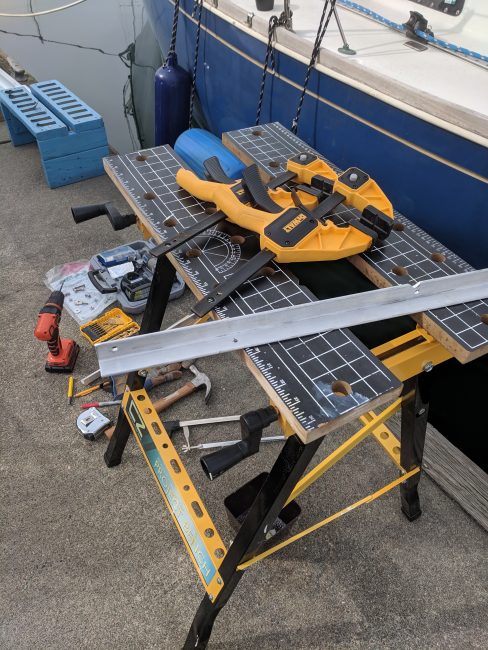
Our batteries were fully charged (by solar) and fluid levels the same as when we left. The bilge had a few gallons of water, but the bilge pump clearly had been working (the water level was up to the float trigger).
Our winterization preparation had worked out well. The thermometer we left inside showed temperatures had hit as low as 20 F (good thing we winterized the engine and water system!) and humidity as high as 95%. Most surprising was the lack of mold or mildew.
As discussed in that earlier post we had decided not to hook up to shore power running a dehumidifier for 5 months. It seems that our Damprid buckets and tea tree oil helped. I also think being on the hard may be a bit drier than on the water, and not having humans on board breathing out water vapor obviously helps a lot too.
The main impact of the 5 months of winter weather was a very dirty boat deck, including the port stern quarter which had flooded a bit (the scupper had frozen water in it and was also clogged from bird debris). Seagulls and other birds had bombed our solar panels with white crusted-on poop and even dropped animal bones onto the deck. This was all solved with a good cleaning, but it took a couple days.
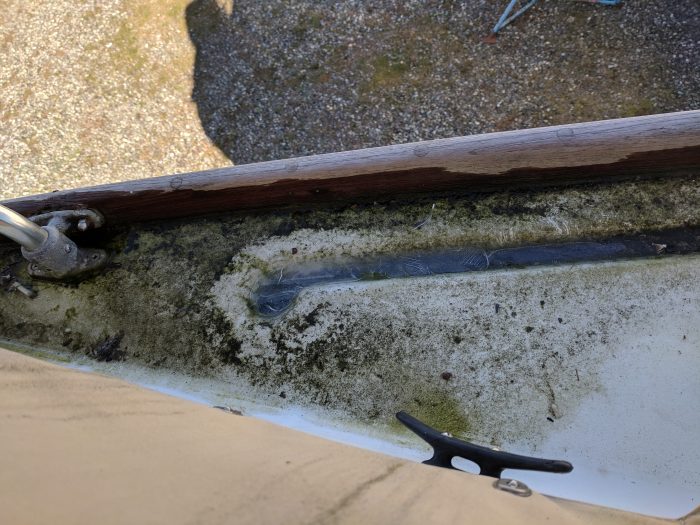
One other impact was our dodger canvas developed a 5” tear at the forward tube. It’s likely there was too much tension on this aging canvas (the solar panels are on top of it, plus about 8” of snow at one point!).
More Solar
One thing I’m working on is adding more solar. The toughest part with solar is usually just figuring out how and where to mount it. We don’t have much unshaded space left, but fortunately have a sturdy radar pole at the stern with an aluminum strut coming off the back.
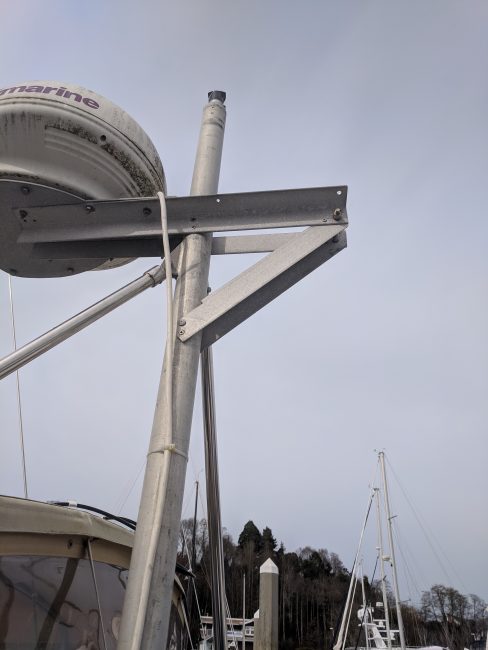
I extended this strut a bit with aluminum angle bars and mounted a 100W panel to it. The placement of the struts isn’t ideal since they’re both near the middle of the panel, but it seems to be sturdy enough (the panel frame itself is quite rigid).
It’s going to get its own Victron 75/10 controller. It would’ve been easier to parallelize it into the existing two 100W flexible panels, but I talked to Victron and they said it’s not recommended to mix panels of different model/brand on the same controller. Every solar panel has a different power curve, which means the optimal power point is at different places on the curve for different panels. Mixing panels would mean the controller couldn’t work efficiently because it would be trying to find the optimal power point for panels with different optimal points.
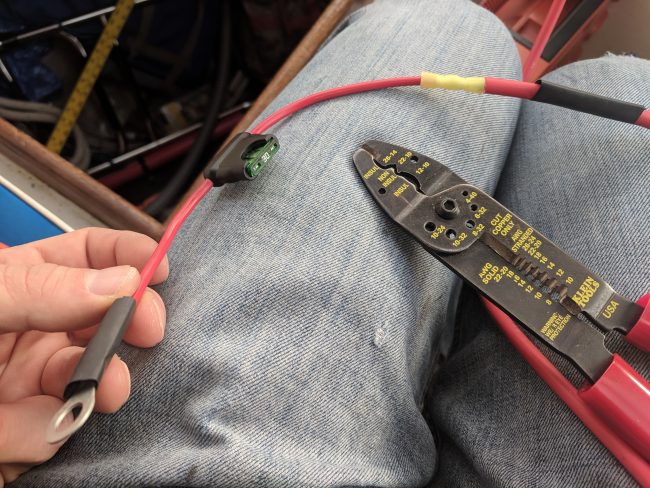
Wiring up the 10 gauge positive wire with a 30 amp fuse
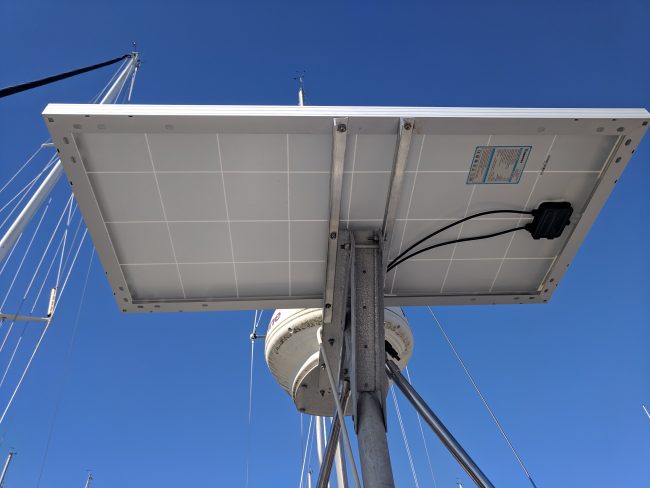
Autopilot
The other big project is installing a below-decks autopilot. This is a tricky one because the C&C Landfall 38 has a very tight space around the rudder, and barely any available space on the rudder shaft. This is typically where a tiller arm is attached.
So far it took 1 1/2 weeks to figure out if there were any off-the-shelf options that would work (there aren’t) and then to find a machine shop, and it’s been 2 weeks waiting for the machine shop to make the part. So not much progress has been made. I’ll write a future post with details about the autopilot install.

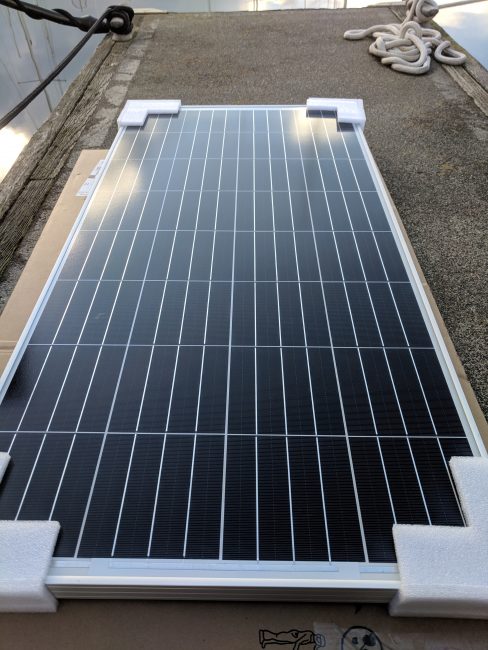
I have owned boats for almost 30 years now, and have never run out of work to do on any of them! They definitely are endless work machines, but like you said, there is great satisfaction in completing updates, maintenance, etc. On days when everything goes wrong, I tend to slow down, and definitely not leave the dock – that can be frustrating, but the good days outweigh the bad, as is the case with most things boat-related.
Happy that your boat weathered the winter! It was pretty extreme here for the area with all the cold and snow this year.
Also neat to see the additional solar panel and Victron’s advice with splitting them across MPPT controllers, which makes sense, but I hadn’t thought of that. Good info to keep in mind!